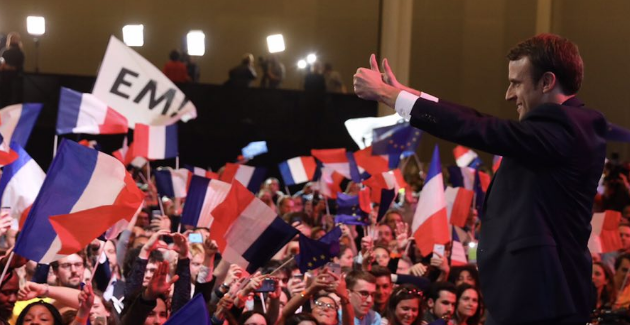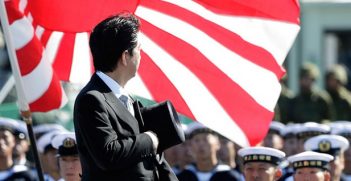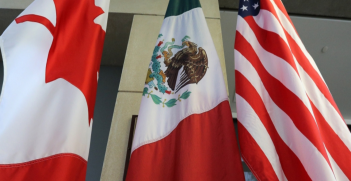Revolution Postponed in French First Round

The first round of voting in the French presidential election delivered centrist Emmanuel Macron and Marine Le Pen of the far-right Front National to the second round. Polling suggests Macron will comfortably win the presidency; his real challenge will come after the June parliamentary elections.
One day after obtaining second place in the French first round vote, Marine Le Pen stepped down “temporarily” as Front National (FN) president, attempting to appear more independent of the far-right movement. In a campaign that saw Emmanuel Macron win the first round, never having held elected office, there may still be a few surprises left before Le Pen and Macron face off for the presidency on 7 May.
This French presidential election will long be remembered as the election with a candidate for everyone across the political spectrum. Eleven candidates stood, the most since 2002 when there were 16. But this was the first time that the four leading candidates all had a fighting chance of getting through to the second round.
Turnout was slightly down from 2012, with approximately 69 per cent of eligible voters taking part, versus 70 per cent in 2012. François Fillon, the centre-right candidate, and Jean-Luc Mélenchon, from the far left, saw their poll numbers surge in the final week. Mélenchon, like Le Pen, is a Eurosceptic but has no interest in France exiting the Eurozone.
The polls proved correct: centrist candidate Emmanuel Macron (En Marche) polled most strongly, winning 8.6 million votes (24 per cent). Marine Le Pen (FN) was more than a million votes behind with 21.3 per cent. Fillon (Republican) with 20 per cent barely edged out Mélenchon (19.6 per cent).
Facing tumbling polling numbers late in the campaign, Le Pen resorted to an even tougher stance on immigration, pledging to “suspend” all immigration. During the televised presidential debate, Le Pen labelled France the “university of jihadism“, referring to domestic Islamist terrorist attacks and French jihadist foreign fighters joining ISIS in Syria. The FN has pledged to renegotiate France’s position in the EU, which would then be put to a national referendum. Le Pen has also canvassed French withdrawal from the Eurozone, the elimination of the euro currency, and the introduction of the “new franc”.
Voting analysis revealed few surprises. According to IPSOS France, the FN drew its strongest support from working-class voters (37 per cent) and retirees were most likely to vote for Fillon (36 per cent). Business people and professionals formed the core of Macron’s victory, but retirees also gave En Marche solid support.
Breaking down the results in terms of age and income, the FN proved most popular with voters in the 35–49 and 50–59 age groups (those most affected by falling incomes since the 2008 global financial crisis). Some 32 per cent of the lowest income group—those earning less than €1,250 (AU$1,820) per month—gave their votes to Le Pen. At the other end of the spectrum, 32 per cent of the highest income group (over €3,000 per month) voted for Macron.
The mainstream centre-left and centre-right can take no comfort from these results. The Parti Socialiste (PS) of François Hollande and Benoît Hamon was decimated in every age and income group, only reaching double digit support (10 per cent) from the 18-24 age bracket. Mélenchon drew 30 per cent of the votes from the 18-24 group. The Republicans, on the other hand, performed strongly among those aged over 70 years (45 per cent) and 60-69 (27 per cent).
Once the outcome was clear, both Fillon and Hamon threw their support behind Macron. Mélenchon refused, stating he would need to consult his membership before committing to any candidate. However, it is unlikely that many far-left voters would support Le Pen, despite some similarities in the anti-Europeanism of both the far-left and far-right parties.
International reaction, both prior to and after the election, has been relatively muted. President Trump’s implicit endorsement of Marine Le Pen could not have been welcomed by the FN camp in a country where anti-Americanism is almost reflexive. The German Chancellor, Angela Merkel, cautiously congratulated Macron, praising his pro-EU platform. However, Merkel’s opponent in this year’s federal election, Martin Schulz, was effusive in his praise for the En Marche leader.
Cohabitation?
Early polls for the second round suggest Macron will win the presidency with 60 per cent of the vote. Le Pen refers to this as “10 little points”. But it would be exceedingly difficult for Le Pen to defy such numbers: to win, she must increase her vote from 21 per cent to 51 per cent. Invariably, a significant proportion of the Republican, PS and Mélenchon vote will swing behind Macron. Catholic conservatives who voted for Fillon may swing some of their votes behind the FN, but they are not a large enough voting bloc to swing the election. Le Pen’s primary task will be to restrict Macron to less than 60 per cent of the vote; to lose by a wide margin would revive memories of 2002, when President Chirac defeated Marine’s father, Jean-Marie Le Pen, 82 to 18 per cent.
The biggest difficulty faced by both the FN and En Marche lies beyond the presidential run-off. In June, France goes to the polls once again to elect members of the National Assembly. The legislative elections, which take place on 11–18 June, will determine whether the new president will confront a compliant or hostile National Assembly. Both presidential candidates are weak in this regard: En Marche has no sitting parliamentarians at all; the FN has only two. The FN is likely to achieve its best parliamentary performance yet, but Le Pen’s campaign has suffered from the outset due to a lack of funding.
The poverty of the PS’ position means that the centre-right could win a parliamentary majority in June. Macron has promised to field candidates in every district and invited members from any party, apart from the FN, to join En Marche, thus entertaining the prospect of ‘a ministry of all the talents’. Defeated presidential candidates, such as François Fillon, cannot be ruled out as prime minister under Macron in a ‘cohabitation’ arrangement. ‘Cohabitation’ featured strongly in French politics under François Mitterrand, who was forced to accommodate a Gaullist prime minister, Jacques Chirac, from 1986 until 1988. Chirac himself, as president, lost the 1997 legislative elections in a landslide to the PS, forcing him to appoint Lionel Jospin prime minister.
If Le Pen were to win the second round, she would likely be constricted by parliamentary gridlock, forced to rely upon short-term decree powers, and unable to undertake either legislative or constitutional reform.
Following the June parliamentary elections, Macron would be able draw together sufficient support from the centre-left and centre-right to form government, although he would likely be forced to compromise with Fillon’s Republicans, effectively forming a coalition cabinet directoire of Republicans and En Marche parliamentarians. That said, Fillon’s and Macron’s economic programs are similarly market-oriented and deregulatory: Fillon wanted to retrench 500,000 civil servants; Macron merely wants to remove 100,000.
The FN’s campaign will focus on Macron and his deals with the political establishment. In contrast, Le Pen will further emphasise the ‘patriotic’, anti-immigration, protectionist and Eurosceptic policies of the FN. This has proven one of the FN’s failings: a negative campaign message that looks to the past, rather than the more positive, reformist message of En Marche.
Anti-establishment, populist political movements, exemplified by the Brexit vote in the UK and Trump’s victory in the US, have been halted in continental Europe. In Austria, the Netherlands and France, the far right has underperformed. Most voters have rejected extremism. In the 2016 Spanish election, the far right remained a tiny minority fringe party. In Germany, Alternative fur Deutschland has slumped in the polls.
Conventional wisdom says Macron should beat Le Pen comfortably in the second round. But this election has transformed the FN into a genuine political force and a realistic contender for the presidency. If Macron fails to deliver reform and renewal by 2022, support for the FN will only grow stronger.
Dr Remy Davison is the Jean Monnet Chair in Politics & Economics at Monash University and a United Nations global expert. He is the author of ‘The Political Economy of the Eurozone Crises’ and ‘The New Global Politics of the Asia-Pacific’ (both forthcoming in 2017).
This article is published under a Creative Commons Licence and may be republished with attribution.





